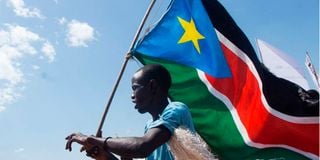Education is key to unlocking the potential of South Sudan

A man carries the South Sudan’s national flag at Mangateen Internally Displaced Persons centre in Juba on November 17, 2018. South Sudan is celebrating its 10th independence anniversary this year.
What you need to know:
- One of the reasons people resisted sending their children to school was because they feared that it would take them away from their cultural tradition.
- Eventually, most people incrementally recognised the value of modern education over their indigenous knowledge.
As South Sudan celebrates the 10th anniversary of their independence, we must remember that South Sudan is a country in painful and desperate need for good news - to inspire hope and motivate people. From the days we used to write with charcoal, there have been tremendous changes in the education sector.
With all the travails and daunting challenges facing the country, South Sudan has witnessed progress in education amidst the foreboding constraints of Covid-19, the pervasive security threats, and the dire economic situation.
Amidst the pandemic, insecurity and dire economic situation, the government was able to fly examination papers to areas that had been hardly reachable under the security conditions prevailing in the country.
Minister Awut Deng told me of occasions when they would fly to an area, only to be forced to turn back because of forbidding weather conditions, and then fly back the next day, with the determination that they must deliver the materials for the exam.
That was repeated in various areas until all the examination areas were reached and all the 64,138 candidates took the exam. Equally touching was that not a single child, or those supervising the exams contracted coronavirus, or was prevented from taking or supervising the exam by intervening ill-health.
Putting this in the broader context of education in South Sudan, I must say that one of the things I find most encouraging in Juba is to observe children of various ages fairly well dressed in impressive uniform and walking to and from school. I find the sight of these children uplifting.
History of education in South Sudan
Even more than the long term promise of the future, I see in them is the fact that their families, or some benefactors, are investing in their education under conditions of severe hardship in the country. As I observe these children, I feel encouraged and confident that our country has a bright future.
Going back to the history of education in South Sudan and how far our people have progressed, I recall our days of pioneering education in the early 1940s under very difficult conditions and the constraints of cultural resistance to education.
One of the reasons people resisted sending their children to school was because they feared that it would take them away from their cultural tradition. The popular saying among the Ngok Dinka was that children were fed with the hearts of vultures. The Dinka see the vulture as a carnivorous bird that is driven by compulsive, selfish, and ruthless greed. Mothers were particularly opposed to their children going to school.
Initially, in some Dinka areas, Chiefs did not want to send their children to school but encouraged others to send their children instead. But some Paramount Chiefs did send their sons to school, and they persuaded the chiefs under their authority to also send their sons to school.
Unfortunately, at the beginning, in most areas, girls were not included, but, later, they were also sent to school. Those Chiefs foresaw that the future lay with education. And, indeed, the sons and daughters of those Chiefs who had the foresight have been among the modern leaders of South Sudan.
Value of modern education
At the early stages, conditions were extremely hard for both pupils and teachers. Those pioneer teachers were truly patriots with a very high level of motivation and dedication. Basic materials were lacking.
For instance, in Abyei elementary school, in 1943, a classroom was a structure made from durra stalks. Minister Awut told me that even as late as 1972, she started her primary education under the tree. The blackboard in our early days at Abyei elementary school was made of mud, from which seats and desks were also constructed. White droppings of birds were used for chalk. And charcoal was the material for pencils.
Eventually, most people incrementally recognised the value of modern education over their indigenous knowledge. They also saw the employment opportunities that accrued with education. Even elders began to say, ‘You educated youth have acquired knowledge that we, your elders, do not have. You are now the leaders of the future’.
Understandably, they acknowledge that the modern context requires modern education. The reason people are now keen to send their children to school is that they realise the value of education, not only for acquiring knowledge, but also for accessing gainful employment and political leadership. They want to prepare their children for a fruitful future.
People now all want to send children to whatever schools they can access, but only those who can afford it send their children to institutions of quality education. The irony is that when people were resisting sending their children to school, education was fully subsidized.
Now that it is becoming too costly for the average person to afford it, education has become very popular. This paradox calls on the state to step in and, as much as possible, make education a national priority for public investment. Every child has the right to education.
Dr Francis Mading Deng is currently Co-Chair of the Governance Working Committee of the Reconstituted Joint Monitoring and Evaluation Commission, R-JMEC, of the South Sudan Revitalized Peace Agreement. He holds a J.S.D. from Yale University.





